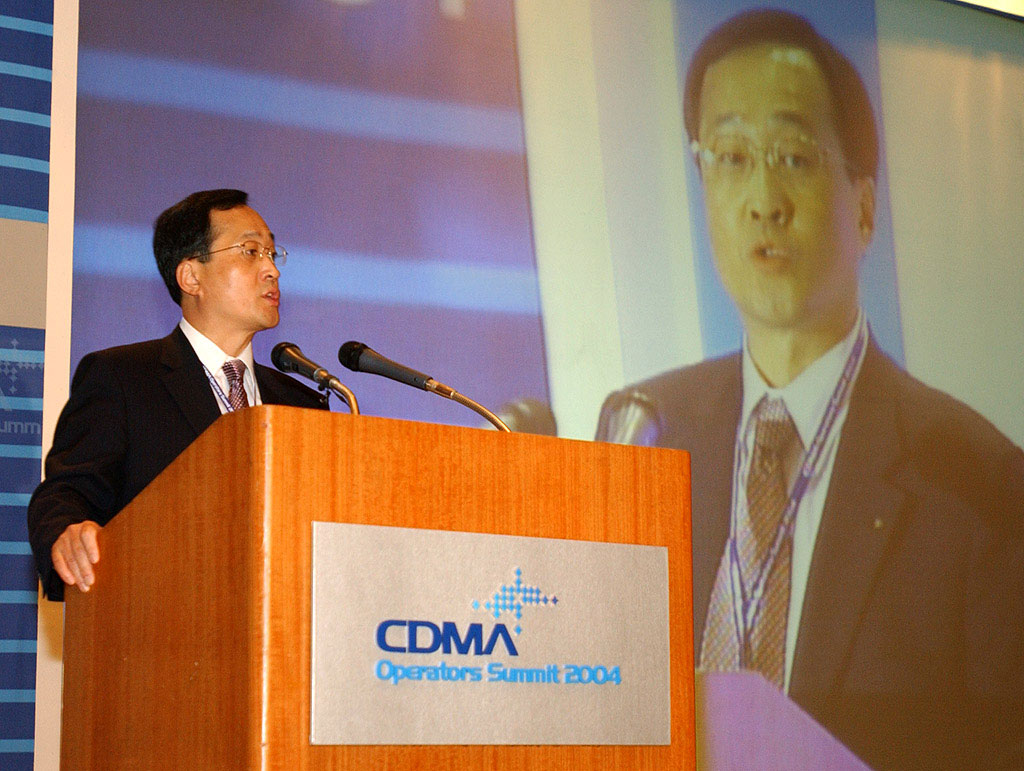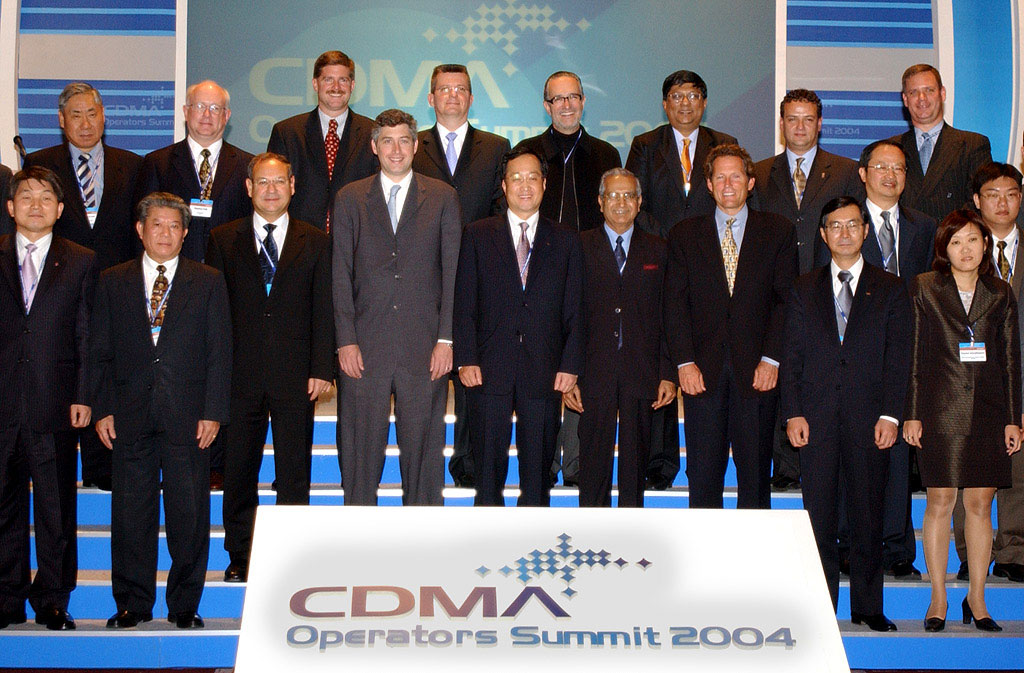content area
Press Release
Strong Cooperation Plans Between Worldwide CDMA Operators Were Discussed During ’CDMA Operators Summit 2004’
2004.10.18 PrintThe cooperative development of universal ’Killer’ content for the wireless Internet was proposed in order to advance the world’s CDMA market
the Establishment of common standards for CDMA terminals around the World, and lowering of terminal price Through Joint purchasing, were also suggested to Secure a competitive-edge over GSM operators.
On October 15th (the second day of ’CDMA Operators Summit 2004’ (http://www.
cos2004.com)hosted by SK Telecom), forums in the three fields of technology, business and terminals for CDMA, were held. The participants in the forums were the CEOs of 26 CDMA operators in 13 countries around the world.
In preparing for these forums, the CDMA operators have been organizing working groups in each field, and mapping out CDMA technological cooperation plans, since May of this year. Shin Bae Kim, president of SK Telecom, Wang Jian Zhou, chairman of China Unicom, and Tadashi Onodera, president of KDDI, presided over the forums that outlined the disclosure of themes, summarized results of the working groups’ activities, and then ended in discussion sessions.
Shin Bae Kim, president of SK Telecom, commented during his welcoming speech at the forum "I am sure Mobile communication operators will play a pivotal role in the converged telecom environment because they are in the best position to figure out customers’ needs through their contact points for implementing new businesses".
The first round of Business Forums was held under the theme of ’The provision of 3G Multimedia Services and Value-added Services’. SK Telecom and Verizon Wireless related their respective EV-DO technology-based multimedia service achievements and network development processes. In addition the Working Group’s activities were presented.
The Business Working Group determined that CDMA operators should further develop wireless Internet capabilities in order to secure a competitive-edge over GSM service operators. To this end, universal ’Killer’ content must be developed using strategies to reduce trial and error activities and increase cooperation and information sharing, among CDMA operators. The Group also proposed the introduction and development of a Removable User Identity Module (R-UIM), and promotion of packet data roaming services between CDMA service providers.
The second round Technology Forum was held under the theme of ’Trend’s in Wireless Internet Platform Operation’. China Unicom disclosed its ’Terminal Platform Adoption and Operation Strategy’, and Pelephone presented ’CDMA Operators’ Platform Operation Methods’.
The Technology Working Group concluded that joint efforts in technological development for CDMA technology standardization, and technological support for data roaming services, are required. They determined this by evaluating the current level of wireless Internet service and its trends, customer attitude analysis, and user interface (UI). The Group also revealed that improved wireless Internet platforms enable a broad spectrum of data services, improvement of average revenue per user (ARPU), and an increase in customer loyalty toward mobile service providers. It also proposed joint development of CDMA technology standardization by forming a working group to share and utilize a variety of resources developed through the CDMA operators’ voluntary participation.
The Terminal Forum was conducted under the theme of ’Terminal Development Direction and Convergence trends’. Sprint introduced ’The Current Status of the Terminal Market for Corporate Clients’, and ’Operational Strategies’. APBW presented ’The Terminal Operation Situation and Strategy for Its Future’, and the "Necessity for Cooperation between Front-Runners and Latecomers’.
The Technology Working Group proposed that securing price competitiveness for low-end terminals is the most important factor for late-coming CDMA operators who have to compete with GSM operators that are currently leading the world’s telecom market. In this regard, the establishment of a common standard for CDMA terminals around the world, and lowering of terminal price through joint purchasing, must be executed.
The Group also suggested that the CDMA operators establish a standard for the use of a GSM-CDMA dual mode based on R-UIM, in the world’s market. To this end, service providers and terminal manufacturers must jointly research and develop R-UIM-enabled CDMA terminal technology.
The first CDMA Operators Summit was held in Beijing in 2002, and the second summit was held in Tokyo in 2003. SK Telecom hosted this third summit in Seoul that lasted for two days. The ’CDMA Operators Summit 2005’ will be held in India.
cos2004.com)hosted by SK Telecom), forums in the three fields of technology, business and terminals for CDMA, were held. The participants in the forums were the CEOs of 26 CDMA operators in 13 countries around the world.
In preparing for these forums, the CDMA operators have been organizing working groups in each field, and mapping out CDMA technological cooperation plans, since May of this year. Shin Bae Kim, president of SK Telecom, Wang Jian Zhou, chairman of China Unicom, and Tadashi Onodera, president of KDDI, presided over the forums that outlined the disclosure of themes, summarized results of the working groups’ activities, and then ended in discussion sessions.
Shin Bae Kim, president of SK Telecom, commented during his welcoming speech at the forum "I am sure Mobile communication operators will play a pivotal role in the converged telecom environment because they are in the best position to figure out customers’ needs through their contact points for implementing new businesses".
The first round of Business Forums was held under the theme of ’The provision of 3G Multimedia Services and Value-added Services’. SK Telecom and Verizon Wireless related their respective EV-DO technology-based multimedia service achievements and network development processes. In addition the Working Group’s activities were presented.
The Business Working Group determined that CDMA operators should further develop wireless Internet capabilities in order to secure a competitive-edge over GSM service operators. To this end, universal ’Killer’ content must be developed using strategies to reduce trial and error activities and increase cooperation and information sharing, among CDMA operators. The Group also proposed the introduction and development of a Removable User Identity Module (R-UIM), and promotion of packet data roaming services between CDMA service providers.
The second round Technology Forum was held under the theme of ’Trend’s in Wireless Internet Platform Operation’. China Unicom disclosed its ’Terminal Platform Adoption and Operation Strategy’, and Pelephone presented ’CDMA Operators’ Platform Operation Methods’.
The Technology Working Group concluded that joint efforts in technological development for CDMA technology standardization, and technological support for data roaming services, are required. They determined this by evaluating the current level of wireless Internet service and its trends, customer attitude analysis, and user interface (UI). The Group also revealed that improved wireless Internet platforms enable a broad spectrum of data services, improvement of average revenue per user (ARPU), and an increase in customer loyalty toward mobile service providers. It also proposed joint development of CDMA technology standardization by forming a working group to share and utilize a variety of resources developed through the CDMA operators’ voluntary participation.
The Terminal Forum was conducted under the theme of ’Terminal Development Direction and Convergence trends’. Sprint introduced ’The Current Status of the Terminal Market for Corporate Clients’, and ’Operational Strategies’. APBW presented ’The Terminal Operation Situation and Strategy for Its Future’, and the "Necessity for Cooperation between Front-Runners and Latecomers’.
The Technology Working Group proposed that securing price competitiveness for low-end terminals is the most important factor for late-coming CDMA operators who have to compete with GSM operators that are currently leading the world’s telecom market. In this regard, the establishment of a common standard for CDMA terminals around the world, and lowering of terminal price through joint purchasing, must be executed.
The Group also suggested that the CDMA operators establish a standard for the use of a GSM-CDMA dual mode based on R-UIM, in the world’s market. To this end, service providers and terminal manufacturers must jointly research and develop R-UIM-enabled CDMA terminal technology.
The first CDMA Operators Summit was held in Beijing in 2002, and the second summit was held in Tokyo in 2003. SK Telecom hosted this third summit in Seoul that lasted for two days. The ’CDMA Operators Summit 2005’ will be held in India.



